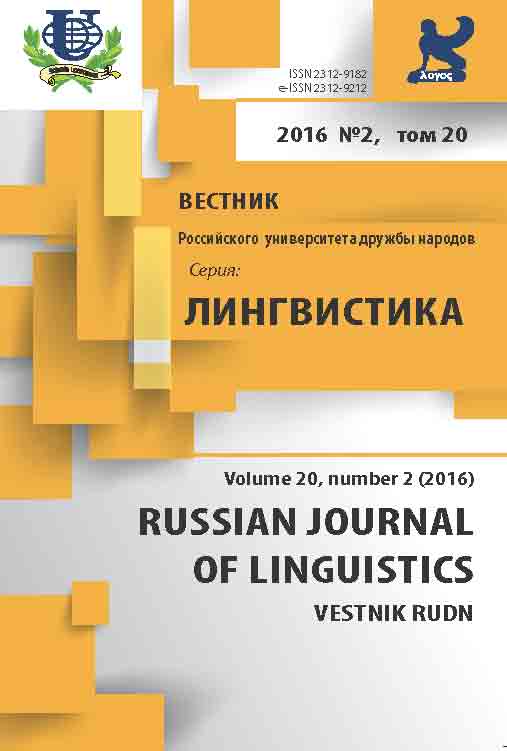The Image of the Enemy as a Stereotype of Thinking
- Authors: Fomenko T.A.1
-
Affiliations:
- The State University of Humanities and Social Studies
- Issue: Vol 20, No 2 (2016)
- Pages: 46-60
- Section: Articles
- URL: https://journals.rudn.ru/linguistics/article/view/14704
- ID: 14704
Cite item
Full Text
Abstract
In this article we analyze the process of stereotype thinking and its verbal expression. We focus our attention on the symbolic vision of our society in the mind of Europeans: Russia is evil, a country where law and democracy have deteriorated. Our aim is to examine the process of mind manipulation and imprinting of the enemy image on the mind of the society by means of communication and show the difficulty of destruction of stereotypes which prevents people of the 21st century from the objective perception of reality. We conducted our study on dictionary entries, articles, B.Obama’s speech in particular, and the extract from David Mitchell’s book “Black Swan Green”. The research is based on the data worked out by a number of sciences: Cultural Linguistics, Psychology, Psycholinguistics, Cross-Cultural Communication. We used the methods of functional and pragmatic analysis of the text. A stereotype is defined as an element of the cultural code which can be decoded by means of language; itt affects the way of thinking, behavior and lexis. Thus, the proposed thesis of a stereotype is supposed to be changing but too slowly. It is concluded that the sterotype “Russia is the enemy” possesses its formal linguistic, mental, and behavioural parametres.
About the authors
Tatiana Andreevna Fomenko
The State University of Humanities and Social Studies
Email: tatfomenko@yandex.ru
State Educational Institution of Higher Education of Moscow Region Zelyonaya St,, 30, Kolomna, the Moscow Region, Russia, 140410
References
- Карасик В.И. О категориях лингвокультурологии // Языковая личность: проблемы коммуникативной деятельности: Сб. научн. Тр. Волгоград: Перемена, 2001. С. 3-16.
- Лесли А. Уайт. Культурология. В кн: Лесли А. Уайт. Энергия и эволюция культуры // Работы Л.А. Уайта по культурологии. (Сборник переводов). М.: Российская академия наук. Институт научной информации по общественным наукам, 1996. C. 162-169.
- Лотман Ю.М. Символ в системе культуры // Лотман Ю.М. Избранные статьи в 3 т. Т. I: Статьи по семиотике и топологии культуры. Таллин: Александра, 1992. С. 191-199.
- Маслова В.А. Лингвокультурология: Учеб. пособие. М.: Академия, 2001. С. 102.
- Пронина Л.А. Информационная культура как механизм саморегуляции общества // Философия, социология и культурология: Вестник ТГУ. 2012. Вып. 3 (107). С. 255.
- Зелинский С.А. Защитные механизмы психики. Характеристика основных защит (Современные психотехнологии манипулирования). СПб.: Издательско-Торговый Дом «СКИФИЯ», 2008. URL: http://psyfactor.org/lib/zln0.htm.
- Гумбольдт В. фон. Язык и философия культуры. М.: Прогресс, 1985.
- Сепир Э. Язык. Введение в изучение речи. М.; Л.: Соцэкгиз, 1993.
- Лотман Ю.М. Внутри мыслящих миров. Человек - текст - семиосфера - история. М., 1999.
- Маковский М.М. Сравнительный словарь мифологической символики в индоевропейских языках: Образ мира и миры образов. М.: Гуманит. изд. центр ВЛАДОС, 1996.
- Ефремова Т.Ф. Новый словарь русского языка. Толково-словообразовательный. В 3 т. М.: Русский язык, 2000.
- Болдырев Н.Н. Языковые категории как формат знания // Вопросы когнитивной лингвистики. 2006. № 2. С. 5-22.
- Психологический словарь / Под общ. ред. А.В. Петровского, М.Г. Ярошевского. 2-е изд., испр. и доп. М.
- Ильин И.А. «О грядущей России»: Избранные статьи / Под ред. Н.П. Полторацкого. М.: Воениздат, 1993.
- Клушина Н.И. Контекстные измерения мифологемы // Стилистика сегодня и завтра: материалы конф. М., 2014. С. 154-157.
- Маслова В.А. Лингвокультурология: Учеб. пособие. М.: Академия, 2001.
- Леонтович О.А. Русские и американцы: парадоксы межкультурного общения: Монография. М.: Гнозис, 2005.
- Bootzin R.R., Bower G.H., Crocker J. Psychology Today. New York, etc.: McGraw-Hill, Inc., 1991.
- Bennet M.J. Towards Ethnorelativism: A Development Model of Intercultural Sensitivity // Education for the Intercultural Experience / Ed. by R.M. Paige. U.S.A.: Intercultural Press, 1993. P. 21-71.
- Грэхэм Л.Р. Естествознание, философия и науки о человеческом поведении в Советском Союзе: Пер. с англ. М.: Политиздат, 1991.
- David Mitchell, Black Swan Green. Sceptre, 2006.
Supplementary files















